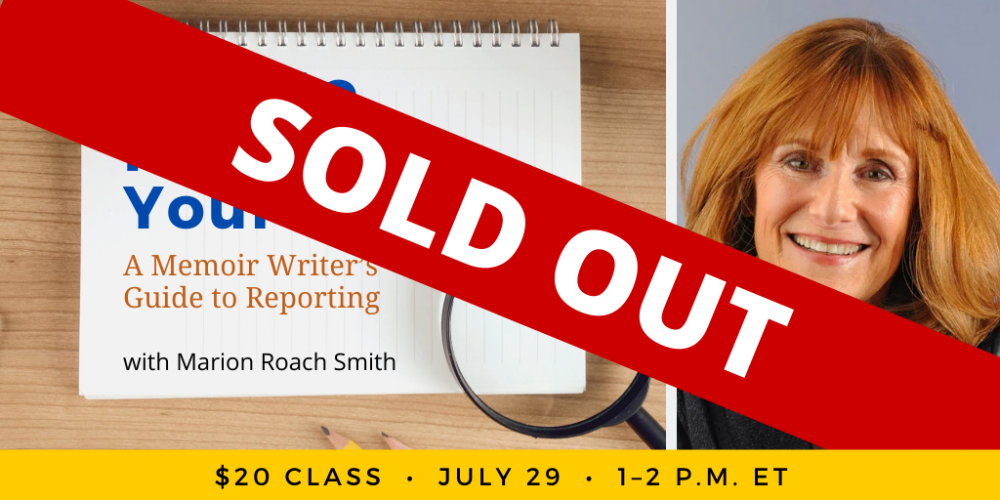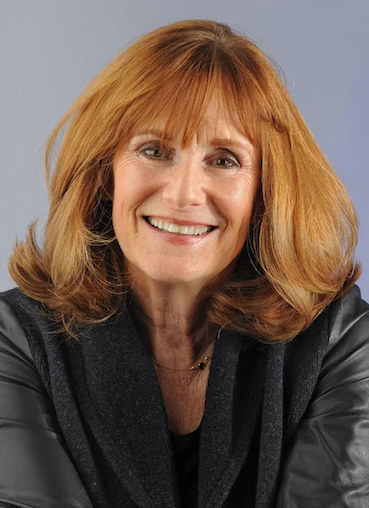
This class is now over and is unavailable for purchase. Sign up to receive announcements about upcoming classes.
A Memoir Writer’s Guide to Reporting and Writing What You (Don’t Yet) Know (or Remember)
Those who want to write memoir frequently make the mistake of thinking they cannot do so because they either don’t remember things or don’t know certain facts. The truth is that neither of these conditions should derail a writing project, because a successful memoirist can draw on a key skill: reporting. Learning the basics of reporting will give you access to the information you need to be that writer.
Successful memoir writers do a great deal of reporting, in fact. Fortunately, basic reporting skills for memoir can be taught, whether it’s how to access a house history or how to interview relatives. Reporting for writing memoir begins with traditional fact-finding.
A common misconception about memoir is that it is a plot-driven genre. It’s not. Your reader is not reading for what you did. Your reader is reading for what you did with it, meaning that we need emotional and historical context for us to relate to your story. Believe it or not, you are not the story of your memoir. Instead, for your memoir to be successful, your story must be an illustration of something universal. So you need to educate yourself on that universal—about healthcare issues, say, or a mental health condition, or the growing seasons in your garden zone, or how and why dogs can do things for people that people simply cannot do for themselves.
In this 60-minute online class (which is recorded if you can’t attend live), you will receive the full palette of skills to master the who, what, when, where and why of reporting on your life. Whether you are interested in a history of your own home, some tips on genealogy, recovering some vague memories of high school or finding out more about your parents’ childhoods, there are basic reporting skills you can learn. With a little work, these can expand to learning who to call for details on the medical background of an illness and research into any category of interest, whether it be dog-breeding or flower-selling or boat-building. Knowing who to call, as well as what these details will do for your tale, is essential to your success.
The first question to answer is this: Why do this? The answer is simple: Creating rich scenes with informed details provides context, something sorely lacking in the stories of most early memoir writers.
While memoir is decidedly subjective—meaning that it is written from your point of view or your version of a tale—that does not mean that you don’t need to know your facts. Those facts provide a worldview for the reader, including the story’s setting and place in time, through which your readers can make a connection to your story.
Who should take this class
- Anyone thinking about writing a memoir
- Writers in the process of drafting a memoir
- Personal essay and creative nonfiction writers
Do I have to attend the live class?
No. Everyone who registers will get access to the recording. However, if you’d like to attend live, keep reading.
How do I attend the live class?
This class uses Zoom webinar technology. You will join through your Internet-connected computer or mobile device. When you register, you will receive information via email on how to join the class. If you don’t receive it within 10 minutes of registering, please contact us.
- When: Wednesday, July 29, 2020
- Time: 1 p.m.–2 p.m. Eastern Time / 10 a.m. Pacific Time
- Fee: $20
The webinar is broadcasted via the internet with live audio delivered through your computer or mobile device speakers. The visual presentation is displayed directly from the presenter’s computer to your computer screen. The Q&A is managed through a chat-style submission system with questions read and answered by the presenter for the entire class to hear.
Attention Mac users: If you experience trouble registering, paying, or joining the class, Safari might be the problem; please try using a different browser such as Google Chrome or Firefox.

About the instructor
Marion Roach Smith is the author of four books, all of which contain a large degree of memoir. Her most recent book is The Memoir Project: A Thoroughly Non-Standardized Text for Writing & Life (Grand Central, 2011). Under the name Marion Roach, she is the author of The Roots of Desire: The Myth, Meaning and Sexual Power of Red Hair (Bloomsbury, 2005); co-author with famed forensic pathologist Michael Baden, M.D., of Dead Reckoning (Simon & Schuster, 2001); and author of Another Name for Madness: One Family’s Dramatic Struggle with Alzheimer’s Disease (Houghton Mifflin, 1985).
A former staff member of The New York Times, she has written for The New York Times Magazine, Prevention, The Daily News, Vogue, Newsday, Good Housekeeping, Martha Stewart Living, Discover and The Los Angeles Times. She is a former commentator on National Public Radio’s All Things Considered, and hosted a regular talk show on Martha Stewart Living Radio, Sirius/XM 110.
Marion Roach Smith isn’t just a fine teacher, generous mentor, and sharp and kind critic, she’s also a master at the form of memoir. She coaxes from you and your text what you’re really trying to communicate. She whittles away the unnecessary until all that’s left is the shining essential: your story.
David Leite
author
It is neither simple nor comfortable to strip yourself naked in 200-plus pages of a memoir. Even more painful is shipping said document to a stranger for a thorough review and content edit. But in hiring Marion Roach Smith to edit my manuscript, I discovered not only a caretaker but a craftsman. Marion knows the art of story: how to pull all the right pieces together, arrange them in perfect order, so the telling is both honoring and rich. She took my raw, exposed draft and helped me turn it into a masterpiece.
Michele Cushatt
author & speaker
Marion has an energetic and positive drive, which make her the powerhouse and perfect teacher that she is. That feeling of empowerment – that “yes-of-course-I-can-do-this” philosophy – never wavered while working with Marion. She is a brilliant writer, who has mastered the art of memoir and story telling. While it is rare to find someone who is passionate about what they do, it is even rarer to find someone who desires to teach those still learning. I am lucky to have found both in Marion.
Deanna Paul
essayist & staff writer, the wall street journal
You’ll receive the following
- Access to the 60-minute interactive class. After 45 minutes, Marion will take questions using in-class chat/text. The class will end after roughly 60 minutes.
- A recording of the class—audio and video. This is especially helpful if you have a conflict with the class time or something comes up and you can’t make the session. Each registration comes with access to the archived version of the program and the materials for 30 days. You do not have to attend the live event to get a recording of the presentation.
- Presentation slides. All participants receive a copy of the slide presentation in PDF form.
- Rough transcript. We use Otter to create an automated transcript of the entire webinar, which we’ll share with you in addition to the audio and video recording.
- A worksheet to help you conduct interviews.
Refund policy
Sorry, but refunds are not offered unless the webinar is canceled or rescheduled. All registrants receive access to the recording even if they are unable to attend. Have questions? You can contact us here.
System requirements to join the webinar
We will be using Zoom webinar technology.
You’ll need:
- An internet connection: broadband wired or wireless (3G or 4G/LTE)
- Speakers: built-in or USB plug-in or wireless Bluetooth
Recommended bandwidth:
- 600kbps (down) for high-quality video and 1.2 Mbps (down) for HD video
- If you connect through audio only: 60-80kbps (down)
Supported operating systems:
- Mac OS X with MacOS 10.7 or later
- Windows 10 (Home, Pro, or Enterprise only), Windows 8 or 8.1, Windows 7
- Windows Vista with SP1 or later
- Windows XP with SP3 or later
- For a full list of supported systems, click here
Supported tablet and mobile devices:
- Surface PRO 2 running Win 8.1 or later. (Win 10 must be Home, Pro, or Enterprise only.)
- iOS and Android devices
- Blackberry devices
Supported browsers:
- Windows: IE 11+, Edge 12+, Firefox 27+, Chrome 30+
- Mac: Safari 7+, Firefox 27+, Chrome 30+
- Linux: Firefox 27+, Chrome 30+
For a detailed listing of system requirements, check Zoom’s site.
